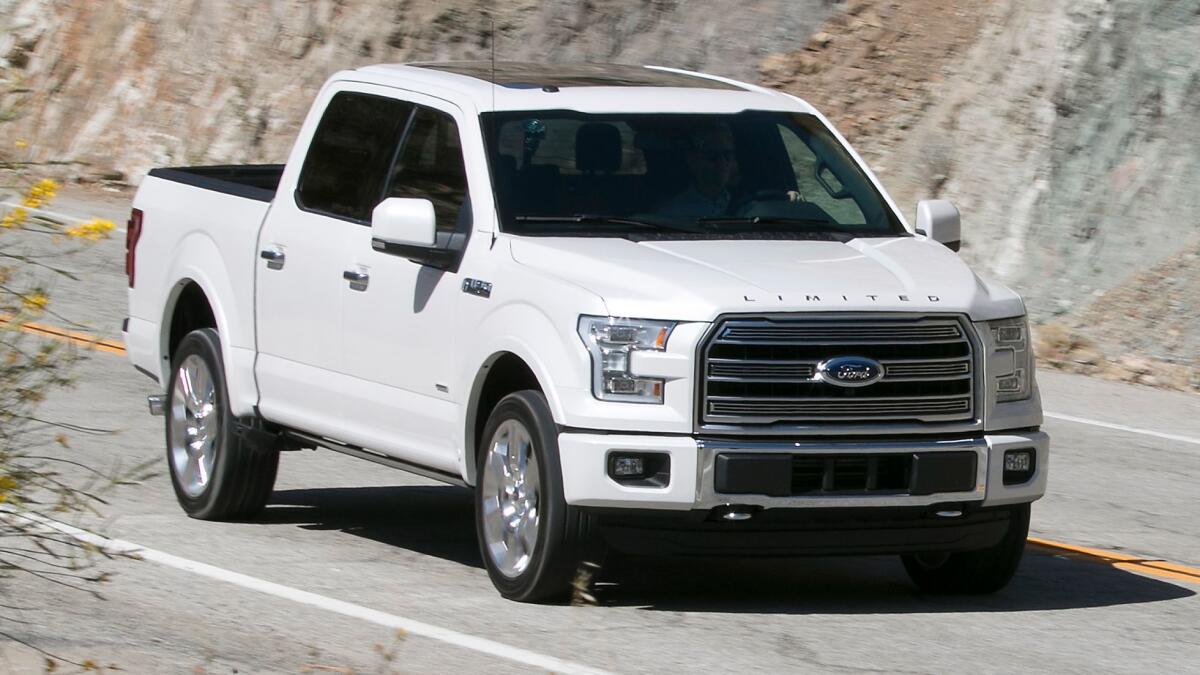2016 U.S. auto sales set a new record high, led by SUVs

- Share via
U.S. consumers bought a record number of new cars and trucks in 2016. A repeat performance in 2017 could be a tall order.
Low gas prices, rising employment and low interest rates kept buyers coming to car dealerships last year. There was also the allure of new technology — such as backup cameras, automatic emergency braking and Apple CarPlay — and new vehicles such as the Chrysler Pacifica minivan, the Honda Civic and the all-electric Chevrolet Bolt.
U.S. vehicle sales totaled 17.55 million, beating 2015’s record of 17.47 million, according to Autodata Corp. It was the seventh consecutive year of year-over-year sales gains, an unprecedented string, said Tom Libby, an analyst with the consulting firm IHS Markit.
That string could be in jeopardy, however. The National Automobile Dealers Assn. expects U.S. sales to drop to 17.1 million vehicles in 2017 as interest rates and vehicle prices rise. Large numbers of cars coming off leases will hit the used-car market next year, putting pressure on new-car sales. And more buyers are opting for longer loans, so they won’t be returning to dealerships anytime soon.
Political issues could also affect sales. President-elect Donald Trump has threatened to impose a 35% tariff on vehicles made in Mexico and exported to the U.S., which would affect every major automaker. But he also has promised more spending on infrastructure, which could boost sales of pickup trucks.
“It is the year of unknowns,” said Michelle Krebs, a senior analyst with the car buying site Autotrader.com.
For now, though, the market has plateaued at a high level. Nissan Motor Co.’s U.S. sales rose 5% last year to more than 1.5 million, a company record. The Subaru brand also set a record, with sales up 6% to 615,132. Honda Motor Co.’s sales jumped 3% to more than 1.6 million. Hyundai Motor Co.’s sales rose 2% to 775,005. Ford Motor Co.’s sales were up less than 1% to more than 2.6 million. Fiat Chrysler’s sales were flat at 2.2 million.
General Motors Co. said its year-over-year sales were down 1.3% to just over 3 million cars and trucks. That was partly because the company cut back on low-profit sales to rental-car firms. Toyota Motor Corp.’s full-year sales fell 2% to 2.4 million. Volkswagen brands sales dropped 8% to 322,948, hurt by the company’s diesel mileage cheating scandal.
Here are some details of 2016 sales:
Winners and losers
Ford’s F-Series pickup remained the bestselling vehicle in America in 2016, with 820,799 trucks sold. That’s the equivalent of 93 trucks sold every hour. The Toyota Camry was the bestselling car, despite a 9.5% drop in sales to 388,618. Jaguar saw the biggest sales increase of any brand, with sales more than doubling compared with 2015 thanks to its new XE sedan. Fiat Chrysler’s Italian brands, Fiat and Alfa Romeo, declined more than 20% each as customers scratched small cars off their shopping lists in favor of SUVs.
Luxury crown
Mercedes-Benz held on to its title as the top-selling luxury brand. Mercedes sales were up less than 1% to 374,541, edging out BMW and Lexus.
SUV takeover
Toyota’s U.S. sales chief, Bill Fay, said consumers’ shift from cars to SUVs is one of the most dramatic the industry has ever seen. Three years ago, trucks and SUVs represented 50% of the U.S. market. They closed 2016 at 63% of total sales, and analysts don’t see that changing anytime soon. Boomers and millennials both like the space and the higher ride that SUVs offer, and improvements in fuel economy make them competitive with cars. The Honda CR-V was the bestselling SUV in the U.S. last year, with sales up 3% to 357,335.
Piling on the deals
Incentive spending reached a record of $4,000 per vehicle in November before falling a bit in December. Buyers were walking away with thousands of dollars in bonus cash or financing deals. Autotrader said Ford was offering as much as $13,000 off its C-Max plug-in hybrid in certain markets in December. But the deals can hurt the industry in the long term, since they damage vehicles’ resale values and automakers’ profits. Automakers, wary of relying too heavily on incentives to move vehicles, started cutting production in the fall. Even with incentives, the average sale price of a vehicle rose to $32,000, a record for December, LMC said.
December to remember
Holiday promotions and elevated incentives boosted sales 3% to 1.7 million, Autodata said. But even if sales had been flat compared with December 2015, 2016 would have broken a record. Volkswagen’s sales jumped 20% over December 2015, while Subaru sales rose 12%. GM and Nissan both gained 10%. Honda’s sales rose 6% and Toyota’s rose 2%. The Nissan Rogue SUV was one of the month’s stars, with sales up 53% as an updated version hit the market.
ALSO
Hulu strikes a deal to live-stream the CBS network
Column: 2016 was an epidemic year for fake news in science, not just politics
Equifax and TransUnion are fined for selling consumers credit scores that most lenders don’t use



